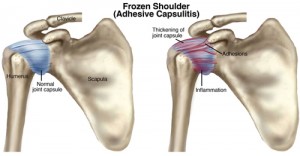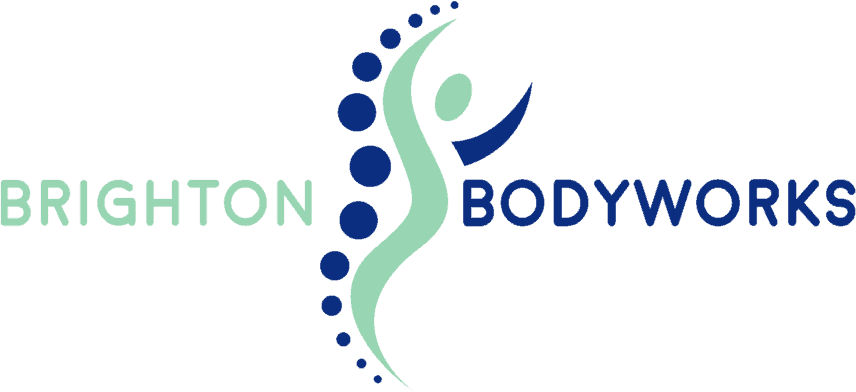Frozen shoulder, or ‘adhesive capsulitis’, is a painful and debilitating condition which restricts movement (specifically abduction and external rotation) of the shoulder. Most often it is seen in 40-60 year olds, and affects twice as many women as it does men. The precise cause of a frozen shoulder is still shrouded in some mystery but contributing factors include periods of immobilistaion (trauma, surgery, impingement), auto-immune conditions and diabetes.
Three stages of frozen shoulder:

Thickening and contraction of the glenohumeral joint capsule and formation of adhesions cause pain and loss of movement
- ‘Freezing’ – Acute and most painful stage where the stiffening is progressing. Pain is often worse at night
- ‘Frozen’ – chronic stage where the pain often subsides, but range of motion is severely affected
- ‘Thawing’ – The frozen shoulder begins to resolve, but can still be very painful and restrictive
The cycle from onset of symptoms to resolution of the frozen shoulder can be up to two years. A doctor may prescribe steroid injections to reduce pain and inflammation, saline injections to improve movement, or refer the patient to a physiotherapist.
The good news!
Precise massage techniques on a number of implicated muscles can be effective in alleviating the symptoms of a frozen shoulder. And if sought during the first ‘freezing’ stage, it can even interrupt the cycle so that the shoulder doesn’t get to the fully frozen stage at all. Importantly, the massage should seek to aid relaxation so as to help calm the nervous system. Clients are often in a lot of pain, and anxious about massage exacerbating this. Trigger point therapy on muscles of the rotator cuff along with soft tissue release and stretching can be used in gentle combination to reduce pain and increase range of motion. Results are not instantaneous, but with regular treatments and with a commitment to following simple homecare advice, symptoms do steadily improve.
If you are suffering with pain of any kind call 01273 729691 to book an appointment with Amy Weinberger at Brighton Bodyworks. Amy is an Advanced Clinical Massage Therapist experienced in treating pathologies of the shoulder. Your first treatment will begin with a consultation and diagnostic testing to assess your condition, and from this Amy will recommend the best treatment plan for you.
